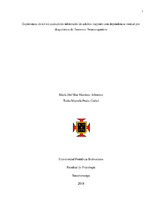Experiencia de rol en cuidadores informales de adultos mayores con dependencia mental por diagnóstico de Trastorno Neurocognitivo
Fecha
2018Director/Asesor
Director. Quintero Mantilla, Margie Stefanía
Tipo de contenido
Trabajo de grado
Citación
Metadatos
Mostrar el registro completo del ítemDocumentos PDF
Resumen
El presente trabajo tuvo como objetivo profundizar en la percepción de la experiencia del rol en cuidadores informales de adultos mayores con dependencia mental por Trastorno Neurocognitivo (TNC) de Bucaramanga y su área metropolitana, con un enfoque cualitativo, con una muestra de 30 cuidadores informales. Así mismo, se empleó una entrevista semiestructurada adaptado del proyecto "Características sociodemográficas y psicológicas de cuidadores informales de adultos mayores con dependencia física y adultos mayores con dependencia mental: Una comparación". En los resultados se evidenciaron que la mayoría de la muestra entrevistada son mujeres con un total del 67%, por otro lado, en relación al tiempo de cuidado un 46%de los cuidadores llevan más de 4 años desempeñando el rol, respecto a las horas de cuidado se evidenció con un 46% que los cuidadores realizan el rol de 8 a 10 horas diarias. Se identificaron y describieron ocho categorías fundamentales que engloban la experiencia del rol en los cuidadores informales de adultos mayores: (1) Significado y conocimiento del diagnóstico, (2) Influencia en la económica, organización y proyecto de vida, (3) Relación previa al diagnóstico e influencia del comportamiento en la vida del cuidador, (4) Influencia en la salud del cuidador, (5) Influencia de la religión o creencia, (6) Decisión, significado y motivación del cuidado, (7) Apoyo en situaciones difíciles y (8) Posibilidad de asistencia; logrando el cumplimiento de los objetivos enunciados inicialmente, brindando una perspectiva de la experiencia del cuidado y evidenciando aspectos positivos y negativos generados en el transcurso del tiempo. The objective of this study was to analyze the perception of role experience in informal caregivers of older adults with mental dependency for Neurocognitive Disorder (TNC) of Bucaramanga and its metropolitan area, with a qualitative approach , with a sample of 30 caregivers informal Likewise, a semistructured interview and MPLOYMENT adapted from the project \WSociodemographic and psychological characteristics of informal caregivers of older adults with physical dependence and older adults with mental dependence : A comparison%". In the results they showed that most of the sample interviewed are women with a total of 67%, p or the other hand, in relation to time care 46% of caregivers takes n m ore than four years playing the role, respect at the hours of care it was evident with 46% that the caregivers perform the role of 8 to 10 hours a day. We identified and described eight fundamental categories that encompass the experience of the role in informal caregivers of older adults: (1) Meaning and knowledge of the diagnosis, (2) Influence on the economic, organization and life project, (3) Relationship prior to diagnosis and influence of behavior in the life of the caregiver, (4) Influence on the health of the caregiver, (5) Influence of the religion or belief, (6) Decision, meaning and motivation of care, (7) Support in difficult situations and (8) Possibility of assistance; Achieving the fulfillment of the objectives stated initially, I offer a perspective of the care experience, and evidencing positive and negative aspects generated in the course of time.
Colecciones
- Trabajos de grado [6698]
El ítem tiene asociados los siguientes ficheros de licencia:


